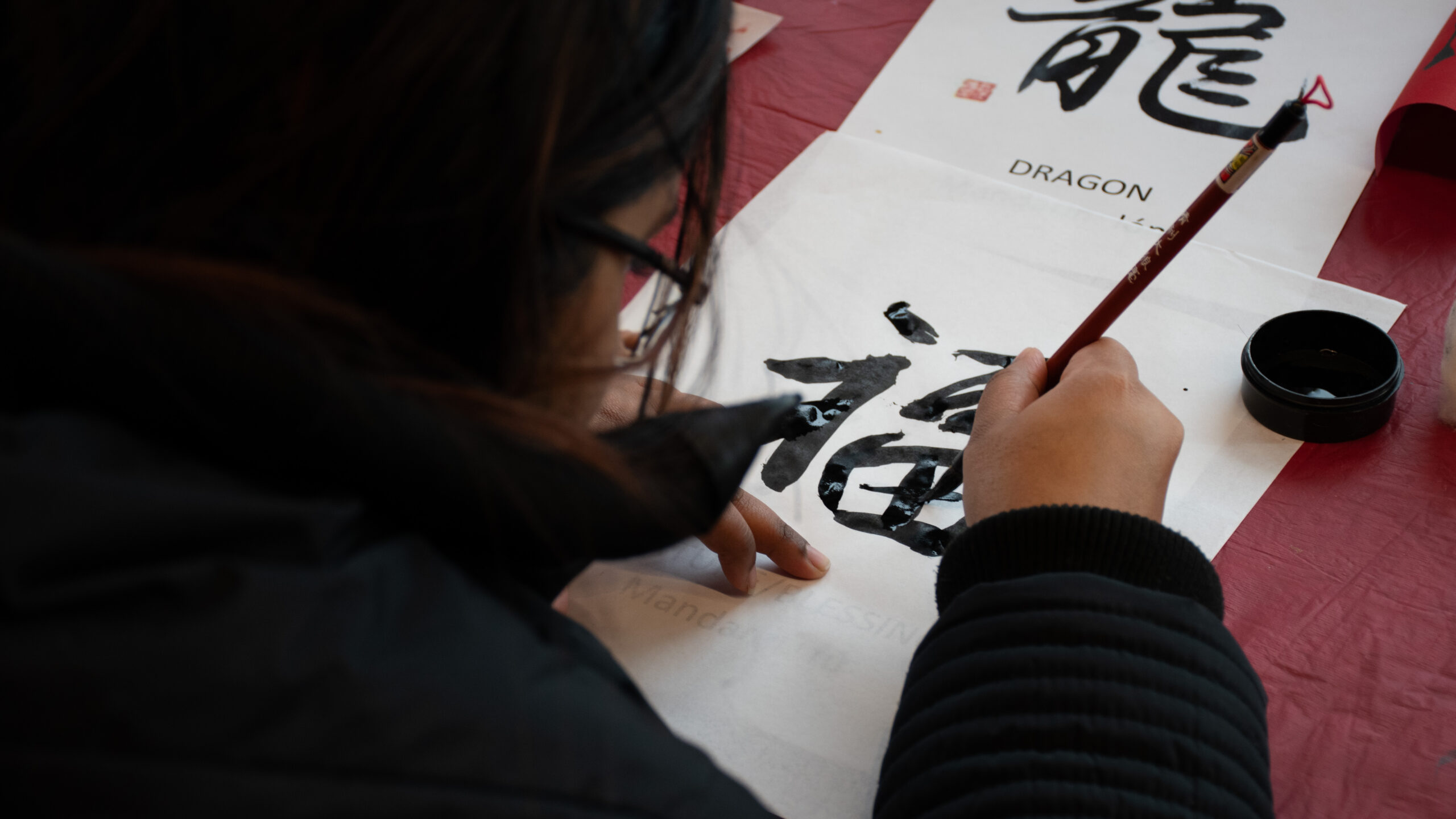Humber College students at the Lakeshore campus ushered in the Year of the Dragon last Thursday with an afternoon of Asian-inspired activities and snacks.
The Lunar New Year — also called the Spring Festival in China, Tet in Vietnam and Seollal in Korea — is the most important holiday in China and in many other Asian communities.
“The best Lunar New Year [celebration] is where we reflect [the] culture of family and friends gathering to kickstart a new year with luck and joy, [regardless of] your race or [Asian background],” said Lucy Luc, FYE student life facilitator and event organizer.
More than 230 students and staff gathered in the G Commons building to immerse in Asian traditions like New Year’s Resolution card making, calligraphy and playing the traditional Vietnamese dice game Bau Cua Tom Ca.
Jenny Fok, a second-year Visual and Digital Arts diploma student from Hong Kong, said the event is really important because it allows the community to show others about Asian cultures.
“At the same time, [students] meet different people from the same places,” Fok said.
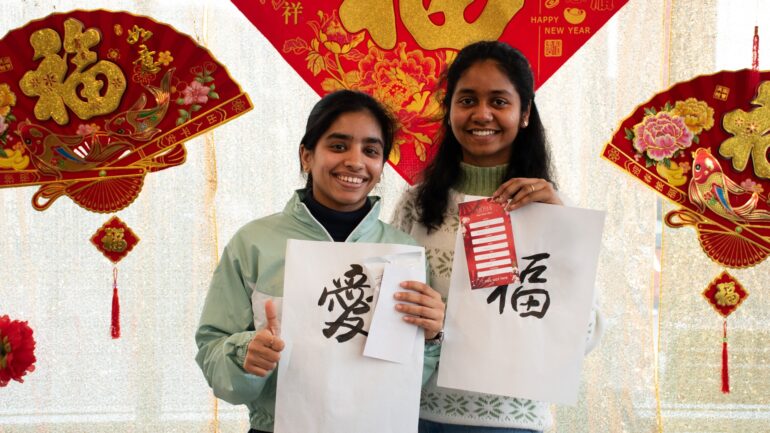
International students Kashish Sethi (left) and Sindhu Appikatla (right) show off their work from the calligraphy and New Year's Resolution card-making stations of the Lunar New Year celebration at the Lakeshore campus on Feb. 8. The event is a chance for students to take a break from school work and explore cultures within the Humber community. Photo credit: Annicca Albano
Each year, Humber College attracts about 10,000 international students.
Sindhu Appikatla, a first-year Global Business Management student from India, is one of them.
“We are very far away from our homes, so experiencing [the traditions] in this country, [we] feel like we all belong together,” she said.
Appikatla said she was invited to the event by a friend who was visiting from the International Graduate School, the downtown campus of Humber.
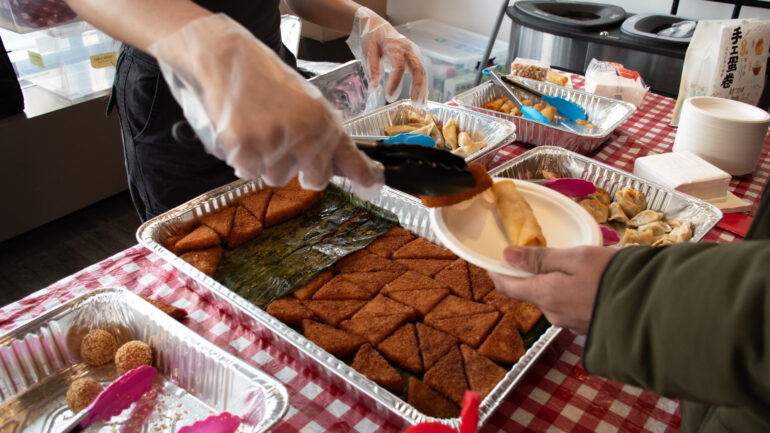
Popular Asian snacks such as coconut fried rice bites and fried spring rolls are given to attendees of the Lunar New Year event celebration at the Lakeshore campus on Feb. 8. Xiaobei Chen, a sociology professor at Carleton University, says food is a way for Asians to express multiple identities and share their culture. Photo credit: Annicca Albano
Students bonded over popular Asian snacks such as coconut fried rice bites, fried spring rolls, chicken dumplings and lemongrass tea.
The glass walls of G Commons were bedecked with Chinese lanterns, paper cuttings and blooming flowers, symbolizing longevity and luck.
The 1998 Disney film Mulan also played throughout the two-hour event for attendees to enjoy.
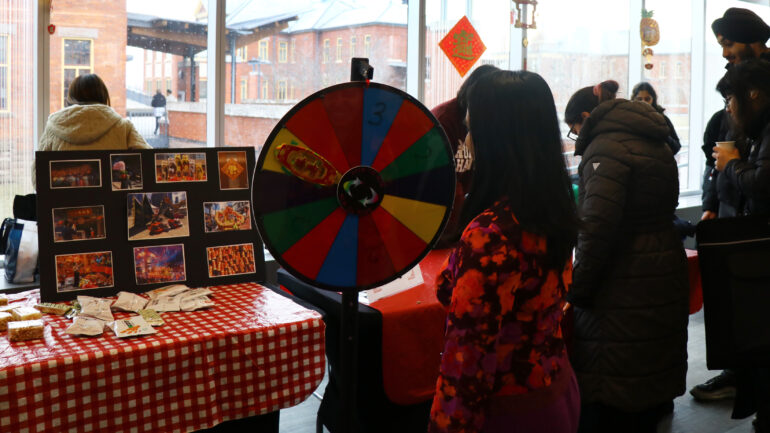
Samantha Maquera, president of the Filipino Association Club at Humber College, spins the wheel at the Lunar New Year event at Humber's Lakeshore campus on Feb. 8. Hosted by the First Year Experience (FYE), the event showcases various activities, games and raffles for students and staff to enjoy. Photo credit: First Year Experience/Samantha Maquera
Xiaobei Chen, a sociology professor at Carleton University, said on-campus Lunar New Year celebrations “mark [schools] in a different way to let people know that this place is also Asian.”
More than seven million people in Canada have Asian origins, according to Statistics Canada’s 2021 census.
The census also showed Asians represent 62 per cent of recent immigrants in Canada from 2016 to 2021.
Chen said the Lunar New Year is not only a time to honour part of Asia’s ancestral culture but also a way for migrants to connect with their heritage culture.
“There are practices around the ritual around food, around the art that we use to express our multiple identities…to express our understanding of ourselves and to celebrate this beautiful multiple, sometimes complicated, connections,” she said.
Chen said cultural traditions are an opportunity to foster respect and build genuine intercultural relationships.
Qiang Zha, a York University professor specializing in Chinese and East Asian higher education, said cultural events like the Lunar New Year also help fight anti-Asian racism.
A study from the Journal of Transcultural Communication revealed that xenophobia and misinformation about the COVID-19 virus led to fear and an increase in anti-Asian behaviour.
“When we celebrate the Lunar New Year, people [can] naturally talk about the contributions made by East Asian Canadians to this society as a whole,” Zha said.
Zha also cited Canada’s International Education Strategy to promote immigration.
“If we can show people [how we] celebrate [and] cherish the multiculturalism, including the Lunar New Year tradition, that will be a very positive [experience] for those international students,” he said.
“[The event] is still meaningful because this is symbolic,” he said. “But that’s not enough.”
To celebrate cultural strengths every day, academic institutions should also recognize epistemological approaches in classrooms that are important to Asian knowledge sharing, Zha said.
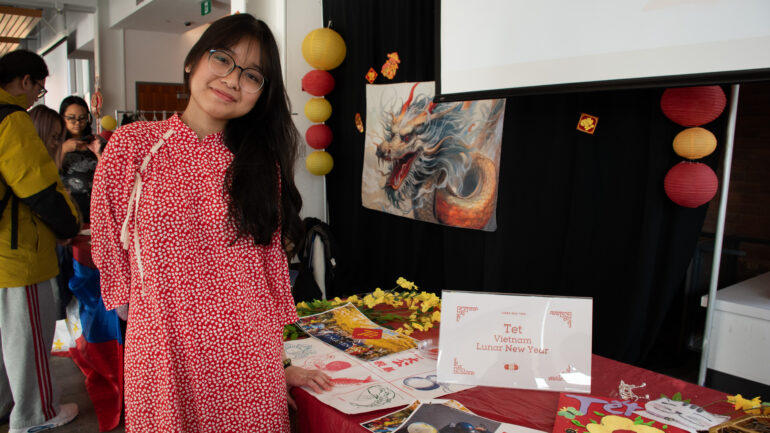
Nhi Luu, a second-year Bachelor of Behavioral Science student from Vietnam, stands beside the Tet Vietnam Lunar New Year booth on Feb. 8. Luu says, "I would like to wish everyone a year of abundance. Have a very good health and new year. Chúc mừng năm mới!” Photo credit: Annicca Albano
For Nhi Luu, a second-year Bachelor of Behavioral Science student from Vietnam, the event is a step in the right direction to encourage conversations among cultures within the Humber community.
“Having friends [from] different parts of the world helps you [be] more open-minded [and compassionate.] You will be more intellectual,” Luu said.

